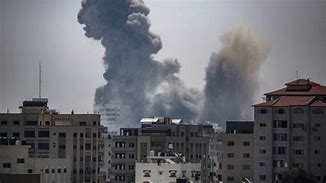Israel Breaks Ceasefire with Massive Airstrikes on Gaza, Over 400 Killed as Global Outrage Grows
Israel’s recent airstrikes on Gaza have shattered the ceasefire agreement, resulting in over 400 casualties and more than 500 wounded, according to Gaza’s Health Ministry. The large-scale attacks, launched early Tuesday morning, mark a grim turning point after nearly two months of ceasefire negotiations, which had temporarily paused 15 months of devastating conflict. The latest escalation has triggered strong reactions globally, with widespread condemnation and fears of further instability in the region.
The Israeli Foreign Minister confirmed that the military operation will continue for several days, dismissing speculation that it was a one-day attack. He further stated that the decision to strike had been made in advance, with an emphasis on minimizing civilian casualties. However, the ground reality tells a different story, as airstrikes have left a trail of destruction in multiple areas, disrupting daily life, especially during the holy month of Ramadan. Schools, which had only recently reopened, have been forced to suspend classes again due to the renewed violence. Heartbreaking images from the affected areas show widespread devastation, with children among the victims.
Israeli Prime Minister Benjamin Netanyahu defended the decision, stating that the attacks were ordered due to a lack of progress in extending the ceasefire negotiations. Officials indicated that this was an open-ended operation with the potential for expansion. Netanyahu, quoted by The New York Times, asserted, “From now on, Israel will act against Hamas with increasing military strength.” The developments underscore Israel’s shift back to full-scale military engagement after a period of diplomatic discussions.
Before launching the airstrikes, Israel consulted the White House, which later voiced support for the military action. This comes in the wake of recent U.S. airstrikes on the Houthi militant group in Yemen, which had targeted Israel with missiles and drones over the past year. Despite the intense attacks, Hamas has not responded militarily but accused Israel of deliberately breaking the ceasefire agreement and endangering hostages still held in Gaza. The militant group warned that the latest escalation threatens the lives of prisoners in Gaza, adding a new layer of uncertainty to the ongoing conflict.
The military offensive has also led to a significant political development in Israel. Itamar Ben-Gvir’s far-right party, which had earlier quit Netanyahu’s coalition over the ceasefire agreement, has now rejoined the government. This move is likely to strengthen Netanyahu’s administration, further fueling tensions and shaping the course of future military actions.
The closure of the Rafah border crossing between Egypt and Gaza has exacerbated the humanitarian crisis. A spokesperson for the European Commission confirmed that the border, a vital passage for aid and supplies, remains shut. The European Union Border Assistance Mission (EUBAM) has initiated emergency procedures to address the growing crisis. With the border sealed, the flow of humanitarian assistance is severely hindered, worsening the already dire living conditions for Gazans.
Turkey and Egypt have strongly condemned Israel’s actions, calling for international intervention. Turkey labeled the strikes as “genocide” and urged the global community to take a firm stance against Israel. Egypt, a key mediator in ceasefire negotiations, denounced the airstrikes as a blatant violation of the agreement and called for immediate efforts to restore stability. The Egyptian Foreign Ministry urged all parties to exercise restraint and allow mediators to continue working towards a permanent ceasefire.
The United Nations has also expressed grave concern over the unfolding humanitarian catastrophe. UN human rights chief Volker Turk described the situation as horrifying, emphasizing that military solutions offer no resolution to the crisis. He reiterated his calls for the unconditional release of hostages and detained individuals while stressing the need for a political settlement. “This nightmare must end immediately,” he declared in a statement. The human cost of the conflict continues to rise, with bodies of dozens of prisoners and civilians being taken to hospitals as airstrikes continue to pound the region.
UNICEF communications specialist Rosalia Bollen, who was in Rafah during the attacks, described the harrowing experience. She recalled waking up to loud explosions and feeling the ground shake as airstrikes hit multiple locations. “The whole night, there was a constant buzzing of drones and planes flying over. We’re seeing, as of this morning, at least several dozen children killed,” she recounted. Her testimony highlights the devastating impact on civilians, particularly displaced families struggling to survive under dire conditions.
As tensions escalate and international pressure mounts, the latest developments in Gaza signal a prolonged and uncertain period of conflict. With diplomatic efforts failing and military actions intensifying, the situation remains critical. The world watches anxiously as the fate of thousands hangs in the balance, hoping for an end to the suffering and a path toward lasting peace.
For video news, visit our YouTube channel THE OLIGO.

